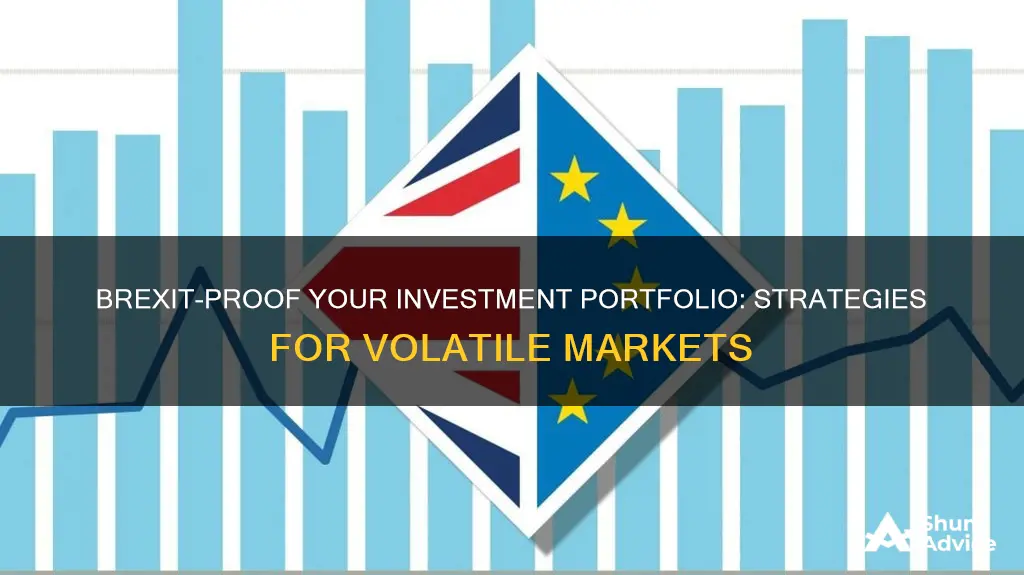
With the future of Brexit still unknown, investors and traders need to be proactive to avoid any sudden shocks. Here are some ways you might be able to Brexit-proof your investment portfolio.
| Characteristics | Values |
|---|---|
| Diversification | Spread risk by investing in exchange traded funds (ETFs), exchange traded commodities (ETCs), investment trusts, or Real Estate Investment Trusts (REITs) |
| Geographical diversification | Consider investing in overseas markets, particularly in the US and Japan |
| Scale | Look for stocks that are geographically diverse and have the scale to absorb inflation or tighter spending |
| Generating cash | Seek out stocks that are generating cash with manageable debt piles |
| Growth | Look for stocks that are still growing and paying dividends |
| Sterling | Consider the impact of movements in the pound on stocks |
| Supply chain | Assess the exposure of stocks to potential tariffs and border checks |
| Dependency on UK and EU sales | Identify stocks with low dependency on UK and EU sales |
| Vitality of products or services | Choose stocks offering vital products or services that consumers will continue to buy in the event of a downturn or if prices rise |
| Brexit preparation | Select stocks that have actively prepared for the worst-case Brexit scenario |
| Structural growth | Pick stocks with leading positions in industries that suffer from chronic undersupply |
What You'll Learn
- Diversify your portfolio geographically and across industries
- Focus on companies with a non-UK/EU presence
- Consider exchange-traded funds (ETFs) and exchange-traded commodities (ETCs)
- Invest in companies with a strong international presence and non-sterling revenues
- Look for stocks that have prepared for the worst-case Brexit scenario

Diversify your portfolio geographically and across industries
Diversifying your portfolio geographically and across industries is a crucial strategy for Brexit-proofing your investments. Here are some ways to achieve this:
Exchange-Traded Funds (ETFs)
ETFs offer geographical diversification and exposure to a wide range of industries and sectors, making them well-positioned to tackle Brexit-related risks. For example, the Vanguard FTSE All-World UCITS ETF provides exposure to over 90% of the global stock market. Another option is to consider ETFs with a narrower focus, such as the iShares Core MSCI Japan IMI UCITS ETF, which provides broad exposure to over 2,700 Japanese stocks.
Exchange-Traded Commodities (ETCs)
If you're less confident about investing directly in stocks, ETCs offer a similar structure to ETFs but track the value of commodities. Commodities are needed worldwide and are therefore shielded from the political turmoil between the UK and the EU. The ETFS All-Commodities ETC, for instance, follows a diverse basket of commodity futures by tracking the Bloomberg Commodity Index.
Investment Trusts
Consider investment trusts that focus on stocks outside of the UK and EU, offering the added benefit of dividends. Alliance Trust, one of the largest investment trusts in the UK, has investments spread worldwide, including holdings in Alphabet, Microsoft, Facebook, and Philip Morris International. Polar Capital Technology Trust is another example, with only 1.4% of its portfolio in UK investments and the rest spread across the US, Canada, and Europe.
Real Estate Investment Trusts (REITs)
Real estate can be a stable investment during uncertain times, though many worry about the impact of Brexit on property prices. Some areas of real estate have proven resilient, such as healthcare, logistical outlets, and storage facilities. For example, Tritax Big Box REIT invests in logistics facilities in the UK, leasing large warehouses to clients with long-term leases, providing transparency over future income. For geographical diversification, consider REITs operating in the US, such as Health Care REIT and Ventas, which invest in hospitals and retirement homes.
Geographically Diverse Stocks
Select stocks that are geographically diverse, have the ability to source and manufacture from multiple regions, and have strong international presence and revenue. Examples include Standard Chartered and HSBC, which derive most of their profits from outside the UK and Europe, and InterContinental Hotel Group, which generates most of its revenue from the Americas and is growing in China.
Inflation-Beating Stocks
Consider stocks that perform well when consumers tighten their belts and inflation rises, which may occur after Brexit. 'Discounters' like B&M, which is rapidly expanding, are likely to benefit from economic hardship. Also, consider companies that help consumers save on non-discretionary services, such as Moneysupermarket.com, which allows consumers to compare prices for insurance and energy.
Brexit-proofing your investment portfolio is challenging due to the uncertainty surrounding the UK's withdrawal from the EU. By diversifying your portfolio geographically and across industries, you can spread the risk and protect your investments from potential shocks.
Investing vs. Saving: What's the Real Difference?
You may want to see also

Focus on companies with a non-UK/EU presence
Focusing on companies with a non-UK/EU presence is a crucial strategy for Brexit-proofing your investment portfolio. Here's why, along with some specific examples for context:
The UK's departure from the EU has already impacted financial markets, and the future relationship between the two remains uncertain. To protect your portfolio, it is essential to consider companies with a diverse geographic reach, particularly those with a significant presence outside of the UK and EU. This strategy helps spread the risk associated with Brexit, as these companies are less likely to be affected by potential tariffs, border checks, and supply chain disruptions.
One example of a company with a strong non-UK/EU presence is Alliance Trust, a large UK investment trust. Alliance Trust's investments are spread globally, and its largest holdings include well-known international companies such as Alphabet, Microsoft, Facebook, and Philip Morris International. This diversification positions Alliance Trust to weather the potential challenges posed by Brexit.
Another example is Craneware, a Scotland-based company providing billing and revenue analytics software to the US healthcare market. Craneware reports its sales and earnings in US dollars, which offers protection from potential economic turmoil caused by Brexit. The company's long-term contracts and high revenue visibility provide an additional layer of reassurance for investors.
Standard Chartered, a banking group, is another excellent illustration of a company with limited exposure to Brexit. Europe and the Americas account for only 4% of its underlying pre-tax profits, with over half of its profits generated in Greater China and North Asia. This geographic diversification makes Standard Chartered a stable investment option during uncertain times.
By focusing on companies with a non-UK/EU presence, you can reduce the potential impact of Brexit on your investment portfolio. These companies' global reach, diverse revenue streams, and limited dependence on the UK and EU markets make them attractive investment opportunities in the face of ongoing uncertainty.
Saving's Leakage and Planned Investment: A Balancing Act
You may want to see also

Consider exchange-traded funds (ETFs) and exchange-traded commodities (ETCs)
Exchange-traded funds (ETFs) and exchange-traded commodities (ETCs) are a great way to Brexit-proof your investment portfolio. Here's why:
Geographical and Industry Diversification
ETFs and ETCs offer exposure to a wide range of industries and sectors worldwide, reducing the risk associated with Brexit. The Vanguard FTSE All-World UCITS ETF, for instance, provides access to over 90% of the global stock market.
Reduced Complexity and Costs
ETCs are a simpler way to gain access to specific commodities without having to trade in futures and options, which are more complex instruments. ETCs also have lower expense ratios compared to ETFs, making them a more cost-effective option.
Exposure to Single Commodities
Unlike ETFs, ETCs allow investors to invest in single commodities and precious metals. This means that if you want to invest in a specific commodity, such as gold, you can do so by purchasing an ETC.
Inflation Hedge and Low Correlation to Equities and Bonds
Investing in commodities through ETCs can act as an inflation hedge and has a low correlation to equities and bonds. This further diversifies your portfolio and protects it from the potential negative impact of Brexit.
Instant Diversification and Lower Fees
ETFs provide instant diversification by investing in multiple assets at once. They also tend to have lower fees than other types of funds, making them a cost-effective way to spread your investment risk.
Easy to Trade
Both ETFs and ETCs are traded on stock exchanges, making them easier to buy and sell than other types of funds. This liquidity allows investors to take advantage of intraday price fluctuations.
In conclusion, ETFs and ETCs are valuable tools for investors looking to Brexit-proof their portfolios. They offer geographical and industry diversification, reduced complexity and costs, exposure to specific commodities, inflation protection, instant diversification, and easy tradability. By utilising these investment vehicles, investors can better protect their portfolios from the uncertainties surrounding Brexit.
Savings Accounts: Invest or Save?
You may want to see also

Invest in companies with a strong international presence and non-sterling revenues
Investing in companies with a strong international presence and non-sterling revenues is a crucial strategy for Brexit-proofing your investment portfolio. Here's why this approach is essential and how you can implement it:
Benefits of Investing in International Companies:
Diversification and Reduced Risk: By investing in companies with a strong international presence, you spread your investments across different markets and industries. This diversification helps to reduce the impact of any single market downturn, including Brexit-related uncertainties in the UK.
Currency Fluctuations: Companies that generate revenues in multiple currencies, especially outside of Sterling, can provide a natural hedge against Brexit-related currency fluctuations. If the pound weakens significantly due to Brexit, companies with significant revenues in other currencies, such as the US dollar or the Euro, may see their earnings rise in Sterling terms.
Access to Global Opportunities: International companies are better positioned to take advantage of growth opportunities in different regions. For example, investing in companies with a strong presence in North America, Asia, or other emerging markets can help you tap into economic growth and consumer demand in those regions.
Implementing the Strategy:
Identify Internationally Focused Companies: Look for companies that derive a significant portion of their revenues and profits from international markets. Check their geographic revenue breakdown and assess if they have a diverse customer base across multiple regions.
Evaluate Currency Exposure: Analyze the currencies in which these companies generate their revenues and profits. Seek out companies that have a substantial portion of their earnings in currencies other than Sterling. This approach will help further diversify your portfolio and protect against Sterling volatility.
Focus on Stable and Growing Industries: When selecting companies with international operations, consider those in stable and growing industries. For example, sectors such as healthcare, technology, and consumer staples tend to be more defensive and resilient during economic downturns.
Consider Exchange-Traded Funds (ETFs): ETFs offer an easy way to gain exposure to a diversified basket of international companies. They provide immediate diversification across various countries, sectors, and industries, helping to further reduce Brexit-related risks.
Monitor Currency Exchange Rates: Stay informed about currency exchange rate fluctuations, especially between Sterling and other major currencies like the US dollar or the Euro. These movements can impact the value of your investments and affect decision-making when buying or selling international stocks.
Remember, while investing in companies with a strong international presence and non-Sterling revenues can help Brexit-proof your portfolio, it's essential to conduct thorough research and due diligence on each investment opportunity. Diversification and currency strategies are crucial, but they should be complemented by fundamental analysis of the companies' financials, business models, and growth prospects.
Savings and Investment: Interplay in a Closed Economy
You may want to see also

Look for stocks that have prepared for the worst-case Brexit scenario
While the future of Brexit is uncertain, investors and traders need to be proactive to avoid any sudden shocks. One way to do this is to look for stocks that have prepared for the worst-case Brexit scenario. These are stocks that have taken steps to mitigate the potential negative impacts of Brexit on their business.
One example of a stock that has prepared for a worst-case Brexit scenario is HSBC. As a global bank with most of its profits derived from outside the UK and Europe, HSBC is expected to be relatively insulated from the potential fallout of Brexit. In the event of a no-deal Brexit, there is a risk of unexpected shocks to the financial system, which could spark a loss of confidence and lead to a full-blown crisis. HSBC's diverse revenue streams make it a more stable investment option in this context.
Another example is the Dalata Hotel Group, which operates in the UK and Ireland. In the event of Brexit, the company's revenue from the UK may be impacted, but its diverse geographic presence helps to mitigate this risk. Since the Brexit referendum, Dalata's share price has risen by 25%, outperformed by InterContinental Hotel Group (IHG), which has seen a 69% rise due to its primary revenue source in the Americas and growth in China.
Investors should also consider stocks that provide vital services and have minimal exposure to the UK, such as Craneware. Craneware provides technology and services to the healthcare industry, helping to improve efficiency and profitability. With its operations primarily based in the US and reporting in dollars, Craneware's stock is expected to be resilient in the face of Brexit.
Other stocks that have prepared for a worst-case Brexit scenario include Wetherspoons, which has been publicly upbeat about the prospects of Brexit, and Jaguar Land Rover, which has taken steps to mitigate potential disruptions by increasing inventory levels to ensure product deliveries continue without delay.
Overall, by looking for stocks that have actively prepared for a worst-case Brexit scenario, investors can help Brexit-proof their investment portfolios and be better positioned to weather any potential fallout from the UK's departure from the EU.
Savings Glut: When Saving Outpaces Investment
You may want to see also
Frequently asked questions
Geographical diversification is one of the best ways to spread the risk attached to Brexit. Consider investing in exchange traded funds (ETFs) that offer the benefit of geographical diversification and exposure to a wide variety of industries and sectors.
The Vanguard FTSE All-World UCITS ETF, which tracks the FTSE All-World index and provides exposure to over 90% of the global stock market, is an example of an ETF that can help Brexit-proof your investment portfolio.
Consider investing in exchange-traded commodities (ETCs), which act like ETFs but track the value of commodities. Commodities are needed everywhere and are therefore shielded from the political turmoil isolated to the UK and the EU.







